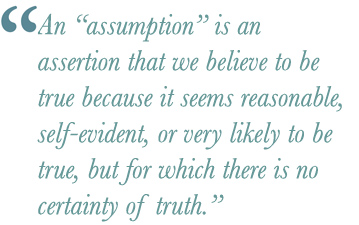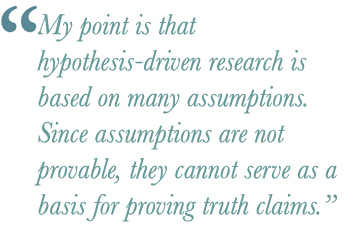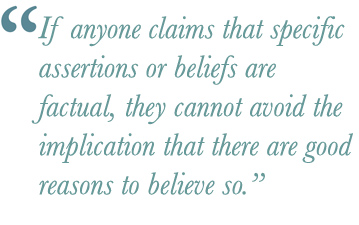By David P. Diaz, Ed.D.
It seems to me that those who grow up with some religious background often make no distinction between the religious beliefs they are taught in church and those they encounter in their secular education. During this youthful formative stage, a belief is a belief, no matter if it is one about miracles or the existence of gravity. However, as these same people grow into maturity, they begin to differentiate beliefs into kinds based on the assumption that religious beliefs rely on unprovable faith and that scientific beliefs rely on reason and evidence. Many people retain this view all their lives. On the one hand, they may assume that all scientific conclusions are based on evidence and represent rationally-held beliefs. On the other hand, they understand religious knowledge to be based on faith, which makes it irrational.
With advanced training in the sciences and philosophy—especially philosophy of science—one should understand that no matter what viewpoint or worldview one holds, he/she must rely on various assumptions, which are themselves unprovable. In the end, one should come to understand that every worldview is based on faith postulates. That is, on unproven or unprovable, assumptions. One simply needs to choose what set of unproven assumptions that he or she wants to support. Hopefully, one will make these decisions based on good reasons and evidence. Unfortunately, this is not always the case.
Assumptions of Science
Let me focus on the assumptions of science since science seems to be accepted as the ultimate arbiter of truth in modern times. An “assumption” is an assertion that we believe to be true because it seems reasonable, self-evident, or very likely to be true, but for which there is no certainty of truth. Collectively, assumptions undergird a necessary part of the framework of scientific discovery.
Below is a list of some of the underlying assumptions that form the foundation of all scientific research. The reader will likely be familiar with the first few but perhaps not so much with the others.1
- There exists a theory-independent external world.
- There is consistency, regularity, pattern, and structure in the causes that operate in the natural world.
- The external world is knowable.
- Objective truth exists.
- Requisite ethical norms for science exist (e.g., honesty in reporting and not faking data, etc.).
- The personal powers of the scientist (e.g., her memory, sensory faculties, judgment, etc.) are reliable.
- The laws of logic are valid and relevant to the process of assessing and manipulating one’s data.
- Communication to the scientific community is necessary and valid.
- Language is adequate to describe the world.
- Nature and induction are constant and uniform.
Notice that several assumptions are correctly understood as philosophical or metaphysical assumptions, thus showing the integration of philosophy, metaphysics, and science.
More Assumptions
But I’m not yet finished with assumptions. Anyone who has ever written a Master’s thesis, doctoral dissertation, or experimental research paper will be well acquainted with the nature of assumptions. Besides acknowledging the ten general assumptions noted above, one must also provide a specific list of assumptions and limitations relevant to the study at hand. A scientific assumption is a proposition or statement that is presumed to be true (Example: “All subjects were honest in answering questions on the medical history questionnaire”). There are also assumptions related to observation and measurement. “Measurements are always made against a backdrop of metaphysical presuppositions, theoretical expectations, and other kinds of belief.”2 Whether or not any given procedure is regarded as adequate depends mainly on the purposes pursued by the individual scientist or group of scientists making the measurements.
My point is that hypothesis-driven research is based on many assumptions. Since assumptions are not provable, they cannot serve as a basis for proving truth claims. Therefore, every scientific conclusion ends up as a provisionally validated opinion. No matter how well the data support a scientific hypothesis, it is still refutable, and that refutation is refutable, etc.
But, if scientific conclusions are based on unprovable assumptions and are merely provisionally true, why has science produced so many significant advances in our knowledge? Although the assumptions of any discipline are unproven and perhaps unprovable, they may also be true. This connection between assumption and truth, in part, explains the successes of not only science but also other disciplines.
Faith and Belief
There is an important distinction between our beliefs and how we place our trust or faith in these beliefs. Throughout our lives, we learn things, and, as we do, we form various opinions (i.e., beliefs) about the world. Those beliefs are what drive our truth claims. It is because I believe in something that I can confidently make a truth claim about it. After all, it wouldn’t do me much good to claim “My grass is green” if I didn’t believe it. Thus, we have faith, or trust, in certain beliefs. For this article, I will note two kinds of faith: (1) Fideism, or “blind faith,” and (2) Evidential faith.
Fideism is where belief takes place without or against reason and evidence. This kind of faith offers no good reasons to justify itself and is, therefore, left rationally unjustified. That doesn’t mean the belief can’t be true; it just means that there has been no attempt to justify the belief rationally.
Evidential faith relies on evidence to justify any particular belief. In this case, one may use various kinds of evidence, including scientific, philosophical/logical, mathematical/statistical, reasoned discourse, historical, empirical, and many other sorts of evidence.
Conclusion
If we believe that objective truth exists and is knowable, then anyone who claims something to be true must bear the burden of justification. Justifying a controversial belief is part and parcel of any kind of debate, religious or otherwise. As with assumptions, many beliefs cannot be proven true. However, one can still provide evidence to justify one’s opinion. And, if successful, one can say that their faith in such a belief is rationally justified.
If anyone claims that specific assertions or beliefs are factual, they cannot avoid the implication that there are good reasons to believe so. Anyone who makes a debatable or controversial truth claim should expect to be challenged on the reasonableness of those claims.
About the Author
David P. Diaz, Ed.D., is the publisher of Things I Believe Project, an online journal devoted to the examination of one’s beliefs. A retired college professor, Dr. Diaz is the author of The Genesis Labyrinth: Investigating alternatives in the first eleven chapters of Genesis (2020, 2nd edition). Dr. Diaz holds Bachelor’s and Master’s degrees (B.S., M.S.) from California Polytechnic State University (SLO) and a doctorate in Education from Nova Southeastern University.
Footnotes
- Excerpted from Diaz, David P. “Seeking Truth: The Limits of Science and the Role of Philosophy and Theology.” Things I Believe Project, 2018. Retrieved from https://www.academia.edu/44459632/Seeking_Truth_The_Limits_of_Science_and_the_Role_of_Philosophy_and_Theology
- Reiss, J. and Sprenger, J. “Scientific Objectivity”, The Stanford Encyclopedia of Philosophy (Winter 2017 Edition), Edward N. Zalta (ed.), Retrieved from https://plato.stanford.edu/archives/win2017/entries/scientific-objectivity



